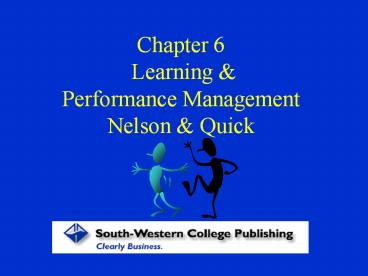Chapter 6 Learning PowerPoint PPT Presentation
Title: Chapter 6 Learning
1
Chapter 6 Learning Performance
ManagementNelson Quick
2
Definition of Learning
- Learning - a change in behavior acquired through
experience
3
Conditioning
- Classical Conditioning - Modifying behavior so
that a conditioned stimulus is paired with an
unconditioned stimulus and elicits an
unconditioned response - Operant Conditioning - Modifying behavior through
the use of positive or negative consequences
following specific behaviors
4
Positive Negative Consequences
- Positive Consequences
- Results of a behavior that a person finds
attractive or pleasurableNegative Consequences - Results of a behavior that a person finds
unattractive or aversive
5
Reinforcement, Punishment Extinction
- Reinforcement - the attempt to develop or
strengthen desirable behavior by either bestowing
positive consequences or withholding negative
consequences - Punishment - the attempt to eliminate or weaken
undesirable behavior by either bestowing negative
consequences or withholding positive consequences - Extinction - the attempt to weaken a behavior by
attaching no consequences to it
6
Reinforcement Punishment Strategies
7
4 Sources of Self-Efficacy
Prior Experiences
Behavior Models
Persuasion from Others
Assessment of Current Physical Emotional
Capabilities
8
Personality Functions Learning
Source O. Kroeger and J. M. Thuesen, Type Talk
The 16 Personality that Determine How We Live,
Love, and Work (New York Dell Publishing Co.,
1988.)
9
Goal Setting at Work
Goal Setting - the process of establishing
desired results that guide and direct behavior
10
Characteristics of Effective Goals
11
Goal Setting Increase Work Motivation Task
Performance
- Employee participation
- Supervisory commitment
- Useful performance feedback
12
Goal Setting Reduce Role Stress
- Reduce role stress associated with conflicting
and confusing expectations - Clarify task-role expectations communicated to
employees - Improve communication between managers and
employees
13
Goal Setting Improve Performance Evaluation
- Management by Objectives (MBO) - a goal-setting
program based on interaction negotiation
between employees and managers - Articulates what to do
- Determines how to do it
14
How is Performance Measured?
- Performance appraisal - the evaluation of a
persons performance - Provides feedback to employees
- Identifies employees developmental needs for
promotion, reward, demotion, termination - Develops information about the organizations
selection and placement decisions
15
Actual Measured Performance
True Assessment
Actual Performance
Measured Performance
16
Actual Measured Performance
Evaluators situational factors Disagreement Emp
loyees temporary personal factors
Performance overlooked by evaluator
Unreliability Invalidity
True Assessment
Deficiency
Actual Performance
Measured Performance
Poorly defined task performance
17
Communicating Performance Feedback
- Refer to employees verbatim statements
observable behavior - Focus on changeable behaviors
- Both employer employee should plan organize
before the session - Begin with something positive
- Self-evaluations
- more satisfying and can improve job performance
- less defensiveness
- but low level agreement with supervisor evaluation
18
Effective Appraisal Systems
- Functions
- Develop people enhance careers
- Emphasize individual growth needs future
performance - Key Characteristics
- Validity
- Reliability
- Responsiveness
- Flexibility
- Equitableness
19
Individual or Team Rewards?
- Individual rewards
- fosters independent behavior
- may lead to creative thinking and novel solutions
- encourages competitive striving within a work
team - Team rewards
- emphasize cooperation joint efforts
- emphasize information sharing
- Both have same purpose
20
Correcting Poor Performance
21
Attribution in Organizations
- Attribution Theory - explains how individuals
pinpoint the causes of their own and others
behavior - Consensus - the extent to which peers in the same
situation behave the same way - Distinctiveness - degree to which the person
behaves the same way in other situations - Consistency - the frequency of a particular
behavior over time
22
Information Cues Attributions
23
Information Cues Attributions
24
Attribution Model
25
Mentoring
- Mentoring - a work relationship that encourages
development and career enhancement for people
moving through the career cycle - Four phases
- initiation
- cultivation
- separation
- redefinition

